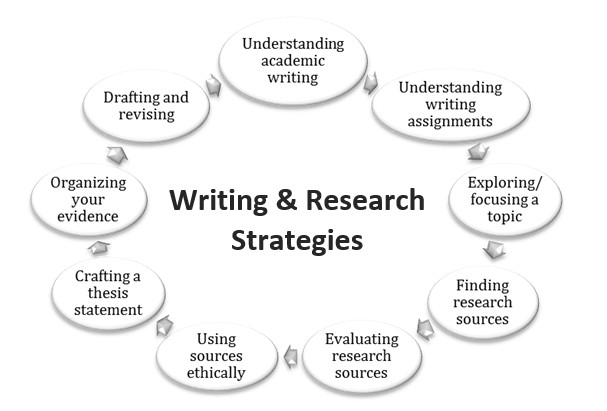
University or academic writing (AW) describes the professional writing that is particular to universities and colleges.
There are many distinct forms or genres of writing within academe, but some common element include:
- a thesis statement (or in science, a hypothesis) and/or a research question
- sound, well-developed argumentation
- citations—references to other sources—to help justify and support the arguments
- attention to concise and correct expression, along with uses of discipline-specific terms.
Your writing assignments prepare you for membership in a discipline.
The goal is to let you communicate your knowledge effectively to those within, and sometimes outside, your field.
TIP: Take time to read and re-read the instructions for a writing assignment, and highlight/underline key words that signal your reader’s expectations.
Here are some typical verbs in academic writing assignments, with their general meanings:
- Analyze: to discover essential features or meaningful patterns; to ask how or why
- Evaluate: to determine significance
- Respond: to formulate an opinion and support it
- Synthesize: to examine, closely study, and evaluate how individual text elements work together Summarize: to convey main points as concisely as possible in your own words
- Define: to determine the essential quality of something; to state meaning and identify qualities
- Explain: to relate cause and effect; make the relationships between things evident (why? how?)
- Describe: to provide specific characteristics and features
Not sure what to write about or how to focus a broad topic? Create claims and ask questions.
If an assignment invites you to pick your own topic, start by writing down your own interests and things you’re curious about. Talk to people and surf the net (incl. blogs) just to get a preliminary idea of what others are saying. This is not formal research, just priming the pump.
If an assignment topic or your own initial idea is too broad, write the broad idea as a complete sentence whose verb expresses an action or relationship: for example, conflict, describe, continue, develop. These verbs help turn your topic into a claim--a simple position or argument that you can develop.
Try generating researchable questions from this basic argument: what? how? why? when? Also consider asking a question that disagrees with your own main argument; this could generate fruitful ideas.
Ask a MOTIVATING question. The basic issue is—“So what?” Why does this topic or question matter? Why is it interesting? To whom is it interesting?
When looking for evidence to support your claims, go beyond Google or Wikipedia.
The library has many resources and services to help you find the kinds of research sources you will need to use for academic writing. The library has resources (books, databases, and more) for all sorts of subjects as well as research guides that divide all the resources along subject lines. Start by looking at the research guide for your subject.
Use the best possible sources for your assignments.
Consider what kind of information you need. Did your professor ask you to reference peer-reviewed articles? Have you been asked to use websites or g overnment statistics? In most cases you will need to incorporate scholarly literature into your research process. Regardless, always ensure that you are evaluating your resources.
TIP: When evaluating websites ask questions around the material’s authority, relevance, purpose, currency, and accuracy. For further help visit: Evaluating resources.
Cite your sources.
Once you have incorporated sources into your writing, you need to reference them properly. This is all part of maintaining your academic integrity. Just as you wouldn’t cheat on an exam, you do not want to be stuck in a situation where you are caught plagiarizing. The library has a number of resources to help you properly attribute the sources you use in your paper.
TIP: Take the SFU Library plagiarism tutorial.
A thesis sentence (statement) expresses the position you’re taking about your topic and indicates supporting arguments or points.
For this reason, a thesis generally takes shape after the research is done and you have a sense of how you will organize your material. Because a thesis statement also forecasts for the reader the main elements your paper will cover, in many papers it’s placed near the beginning.
2 tips to build your thesis:
- Organize your most important pieces of evidence to create a logical pattern.
- When drafting your thesis, avoid stating the obvious or rewording the beliefs or viewpoints of your sources.
Use your thesis and evidence to organize your paper.
As you formulate your thesis, you will start to see the main points of your paper. From those points, create an outline. This often makes it easier to write the first draft.
Drafting and revising is an essential part of writing
Your first draft puts flesh on a skeleton of ideas, points, and information, but it’s not yet finished. When planning your assignment, allow time for several drafts. Never hand in an unedited draft, not even for in-class writing or an essay test.
Writing under pressure?
- Leave a few minutes near the end of the test for a complete read-through.
- Make sure your introduction sets out your position and forecasts your main points, your paragraphs develop each point, and your conclusion answers “So what?”
- Look for missing or wrong words, major misspellings, incomplete or illogical sentences, or grammar errors that could affect meaning.
Want to learn more about editing your own writing? The Student Learning Commons can assist you.
Know where to find help when you need it!
The Student Learning Commons offers writing consultations and other support.
The Library offers help with research strategies, proper citation, locating resources, and more.
You can find the online presentation at prezi.com: enter “Writing & Research Success” in the Search field.
